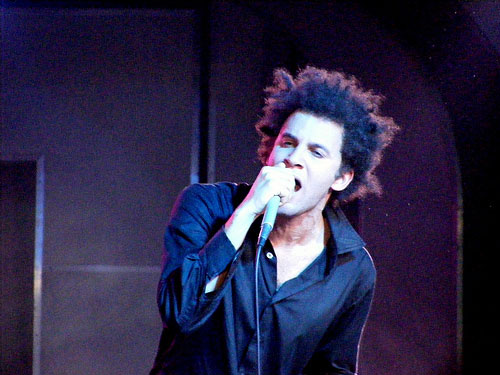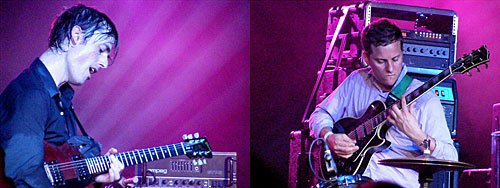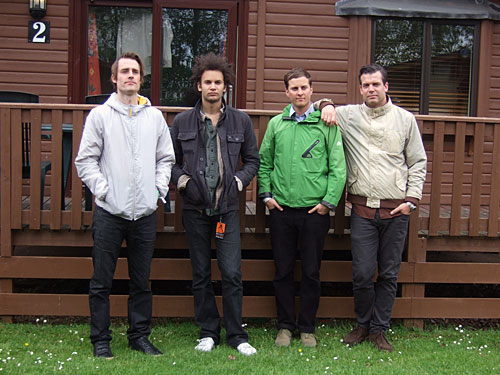Battles
‘We would be called Blood Beak, or Blood Fart, or Blood Pizza. Yeah, Blood Pizza.’ When we caught up with Battles at All Tomorrow’s Parties recently, they were in high spirits, debating pub quiz team names, who would win at pool, and whether they should stick around for the forthcoming Sugababes/Wrestlemania double header at the Minehead Butlin’s camp that hosted that festival.
In person, they’re a surprisingly genial bunch, far from the impression some might have of them as austere and serious muso types: something Ian Williams (guitar/keys) gives a nod to when he quips ‘I’m good at geometry, so by default I’d be the best at pool’.
Over the past year especially, Battles have put in some of the most remarkable live performances I’ve seen in years, something that Williams, while not visibly flicking through a book of musicians’ interview clichés, puts down to a connection with the audience: ‘If you can feel their enthusiasm, it always makes you rise to the occasion more than you might otherwise. There are some shows where the audience is so pumped and on it that you don’t even have the chance not to be good.’
Tyondai Braxton (vocals/guitar/keyboard) chips in, citing the UK (and specifically Galway in Ireland – take a bow, Galway gig-going types) as his favourite place to play: ‘We do really well in the UK and in Japan – I don’t know what it is about island nations. They both fetishise aspects of culture more extremely than in other parts of the world. I don’t know why, that’s something for you to figure out by yourselves.’

With so much kit to set up – laptops, keys, samplers, various other flashing boxes, and of course that seven-foot high hat – Battles can sometimes seem to be struggling with soundmen who don’t quite nail what they’re about, but do they face more technical problems more than the average pub rock band? Not really, says drummer John Stanier: ‘No matter how little equipment you have, there’s always the potential for something to go wrong. If nothing else, we’re seasoned professionals when it comes to setting up and packing down, so I think we have that down to a science.’
Tyondai pipes up, apparently enthused by the soothing effect of packing up after a show: ‘Winding up your wires at the end of the night can have a soothing Zen effect on you as this focused, habitual thing that you do. When you’re touring you don’t get many things that are the same, but that is at least pretty constant.’
Has all the touring Battles have been doing over the past year thrown up ideas for a second studio album proper? To Ian, playing live and making a record are completely distinct from one another, so it’s too early to say what post-Mirrored Battles might sound like: ‘We’re just coming off a long period of touring ,and you almost have one head for touring and playing live and another head for writing new material, so we’re not in that frame of mind right now.’ Guitarist Dave Konopka, who gives the impression throughout that he’s the band joker, adds drily that they’re ‘going to keep milking the Mirrored tour until, like, 2012 or something, until ATP asks us to play it for Don’t Look Back, then we’ll stop.’
Talking of Mirrored, rarely has such an ostensibly leftfield record made such inroads into the popular consciousness. It’s been described as ‘a breathtaking aesthetic left turn’ and, more bewilderingly, ‘a hover of trained hummingbirds’ – but was there an intention to confound as well as delight behind the album? For Tyondai, Battles ‘weren’t looking to be from the future or anything. The band is made up of a collection of extreme individuals and Mirrored is the result of extreme compromise on all of our behalfs, so that we all get off artistically and still have it be a cohesive band. So that’s kind of the formula – it’s very natural, and we’re not in the studio asking ourselves “how can I make this sound like it’s from a different era?”, because that would cheapen it. We’ll just continue with this natural progression and hopefully still be able to make interesting music.’
OK, so we’re curious about how Battles write one of their head-spinning symphonies, and initially we’re met with a sarcastic reply of ‘magical places’, the band apparently sick of critics pulling their songs apart to see what’s underneath. When we probe a little deeper, though, it seems to be about compromise and creating space for everyone to express themselves. Ian explains: ‘If I have a cool riff and I glue it onto a cool riff that Ty has, I need to make sure that mine doesn’t trample on his, and that there’s a purpose for my riff as well as his. Does it add without taking anything away? That’s the weird equation you have to figure out in all our songs’.

When Battles really open up, though, is when we come onto the question of what place there is for more avant-garde and outré musical forms in today’s music scene. Dave agrees that there’s ‘more space in music today for more creative ideas and challenging song structures, the reason being that the music industry has previously been dominated so much by fat cats who sit in their offices and pick off good-looking bands who they think can make it and sell a lot of records, then a bunch of teenage girls go crazy over it and they end up making a lot of money. On the other hand, now it’s not as important because the means to expose your band to a new audience, i.e. the internet, are there, and it’s easier for bands not to have to go through this ‘cookie cutter’ process. There’s no longer the weird process where the record label can say things like ‘that’s a good song, but the moaning is a bit weird, so can you take it out’, but now you can put out an entire record of moaning and start up a moaning sub-genre [cue comedy moaning from the rest of the band, who fall about laughing]. Everybody can be a bedroom rock star, and has the means to appear that way. The best thing to come out of this is a wider acceptance within popular culture of more creative musical ideas – I think that’s a healthy thing for us, both as Battles and as music lovers.’
‘I think the internet thing can be a two-way street though’, adds Ian. ‘For instance, it’s great for more progressive politics, but it does help the right wing as well. I wonder if the internet and more accessibility ruins things as much as it helps sometimes. While adventurous music has more ways of getting out there, at the same time what is called indie and alternative and underground has actually become far more conservative and become this great mass of averageness.
‘Due to Darwinian principles, in the past only ten per cent of the smartest people would listen to good music in the past, now I think eighty per cent of people listen to what they think is good music, but their demands are very different and everything dumbs down a little bit.’
Tyondai develops the idea further: ‘I think bands now aren’t as scared. The internet has a lot to do with it, but I also think that bands are less timid about coming up with creative ideas as opposed to feeling the pressure of fitting in with this bigger scene. The fear has disappeared a bit, and that may be because confidence has increased because they know they’ll be able to get the word out via the internet. In a lot of ways it’s up to the musician – if they’re into the idea of diving a little deeper and taking things a little further then no one’s stopping them. It’s a case of doing it, feeling confident about doing it, then hopefully having the means to get the word out.’
The last word, as often seems to be the case with Battles, goes to Dave Konopka, who by now has warmed to the theme: ‘I’m sure there are just as many weird ideas in music that we’ve just never been exposed to. There must be a lot of crazy bands out there we’ve never heard, but that’s living in the land of ‘what ifs’, and my chemistry teacher told me never to live in the land of ‘what ifs’.’
– Battles
